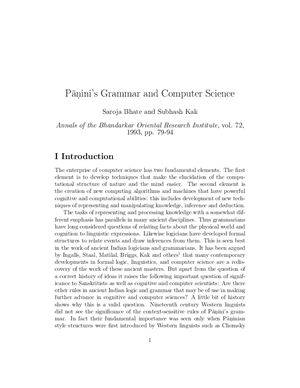Annals of the Bhandarkar Oriental Research Institute,vol.72,
1993,pp.79-94
Introduction
The enterprise of computer science hast 2 fundamental elements.The fi rst
element is to develop techniques that make the elucidation of the compu-
tational structure of nature and the mind easier.The second element is
the creation of new computing algorithms and machines that have powerful
cognitive and computational abilities : this includes development of new tech-
niques of representing and manipulating knowledge,inference and deduction.
The tasks of representing and processing knowledge with a somewhat dif-
ferent emphasis has parallels in many ancient disciplines.Thus grammarians
have long considered questions of relating facts about the physical world and
cognition to linguistic expressions.Likewise logicians have developed formal
structures to relate events and draw inferences from them.This is seen best
in the work of ancient Indian logicians and grammarians.It has been argued
by Ingalls, Staal, Matilal, Briggs, Kak and others that many contemporary
developments in formal logic,linguistics,and computer science are a redis-
covery of the work of these ancient masters.
Introduction
The enterprise of computer science hast 2 fundamental elements.The fi rst
element is to develop techniques that make the elucidation of the compu-
tational structure of nature and the mind easier.The second element is
the creation of new computing algorithms and machines that have powerful
cognitive and computational abilities : this includes development of new tech-
niques of representing and manipulating knowledge,inference and deduction.
The tasks of representing and processing knowledge with a somewhat dif-
ferent emphasis has parallels in many ancient disciplines.Thus grammarians
have long considered questions of relating facts about the physical world and
cognition to linguistic expressions.Likewise logicians have developed formal
structures to relate events and draw inferences from them.This is seen best
in the work of ancient Indian logicians and grammarians.It has been argued
by Ingalls, Staal, Matilal, Briggs, Kak and others that many contemporary
developments in formal logic,linguistics,and computer science are a redis-
covery of the work of these ancient masters.

